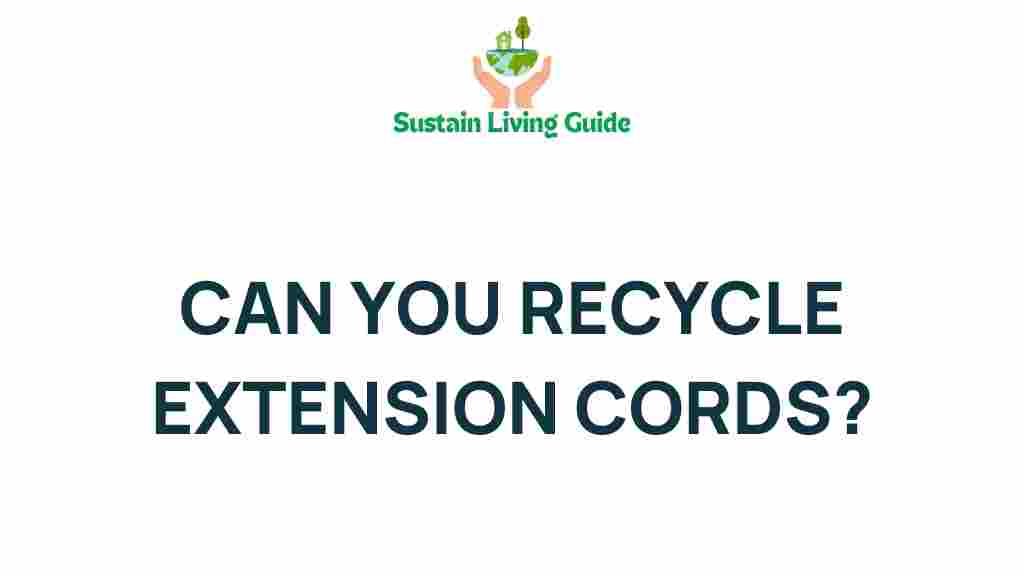Unraveling the Mystery: Can You Recycle Extension Cords?
As we become more environmentally conscious, the topic of recycling is more relevant than ever. From plastic bottles to old electronics, many people are eager to find ways to recycle their unused items. But what about extension cords? You might be wondering, “Can you recycle extension cords?” This article dives deep into the recycling process of extension cords, exploring what materials they are made from, how to dispose of them responsibly, and the best practices for recycling.
Understanding Extension Cords
Extension cords are versatile tools that provide additional electrical outlets, extending the reach of power for a variety of devices. However, they do wear out over time or may become damaged. When they are no longer usable, it is essential to consider how to recycle them properly.
What Are Extension Cords Made Of?
To determine whether you can recycle extension cords, it’s important to understand their composition. Most extension cords are made from:
- Plastic: The outer casing is typically made from PVC (polyvinyl chloride), which is a type of plastic that is recyclable under specific conditions.
- Copper: The wires inside extension cords are usually made from copper, a highly recyclable metal.
- Rubber: Some cords may have rubber insulation, which can also be recycled in certain facilities.
How to Recycle Extension Cords
Now that you know what extension cords are made of, let’s discuss how you can recycle them effectively. Follow these steps for a hassle-free recycling process:
Step 1: Assess the Condition of the Cord
Before recycling, check if your extension cord is still functional. If it is, consider donating it to a local charity or giving it away to someone who might need it. If it’s damaged or non-functional, proceed to the next steps.
Step 2: Locate a Recycling Center
Not all recycling centers accept extension cords, so it’s crucial to find one that does. You can:
- Search online for electronic waste recycling centers in your area.
- Contact local waste management services to get information on their recycling programs.
- Visit websites like Earth911 that provide resources on how to recycle various materials.
Step 3: Prepare the Cord for Recycling
Before dropping off your extension cord, ensure it’s prepared for recycling:
- Remove any attachments: Detach any plugs, connectors, or other components.
- Clean the cord: Wipe off any dirt or debris to ensure it is in a recyclable condition.
- Bundle the cords: If you have multiple cords, bundle them together to make transportation easier.
Step 4: Drop Off the Cord
Visit the recycling center and drop off your extension cord. If the facility has specific guidelines, be sure to follow them to ensure proper recycling.
Troubleshooting Recycling Issues
While recycling extension cords is straightforward, you may encounter some challenges. Here are a few troubleshooting tips:
Not Sure Where to Recycle?
If you are having trouble finding a recycling center, consider:
- Asking your local hardware store if they have a recycling program.
- Checking if your community has organized e-waste collection events.
Extension Cord Still Works
If your extension cord is still functional, think about these options:
- Donation: Many local charities and thrift stores accept working extension cords.
- Repurpose: Use it for a different purpose, such as outdoor lighting or powering garden tools.
Recycling Center Won’t Accept It
If the recycling center you visit will not accept extension cords, look for alternative options:
- Check for metal recycling centers that accept copper wires.
- Find a specialized e-waste recycling facility that deals with electronic items.
Conclusion
In conclusion, recycling extension cords is not only possible but also essential for reducing waste and conserving resources. By understanding the materials involved and following the steps outlined in this article, you can ensure that your old or damaged extension cords are disposed of responsibly. Remember, if your extension cord is still functional, consider donating it or repurposing it before deciding to recycle. Let’s work together to promote a sustainable future by making informed choices about recycling and waste management.
For more information on recycling and sustainability practices, check out our other articles on how to reduce waste and promote eco-friendly habits in your home.
This article is in the category Waste and created by SustainLivingGuide Team
